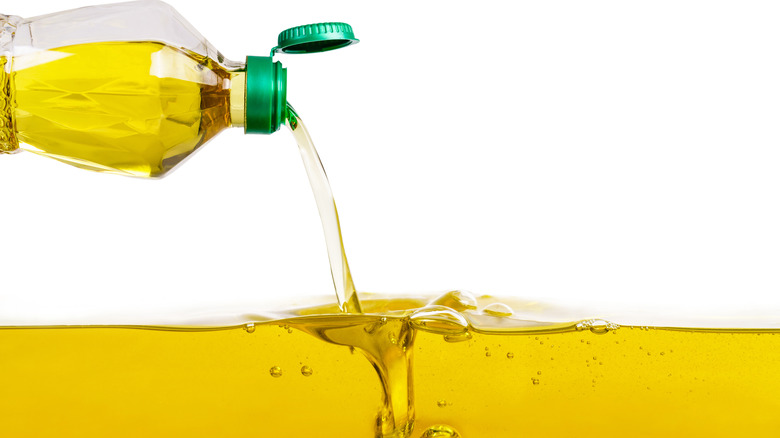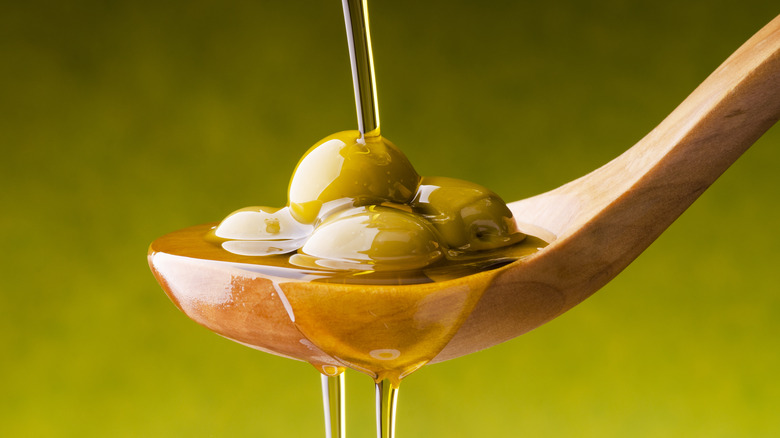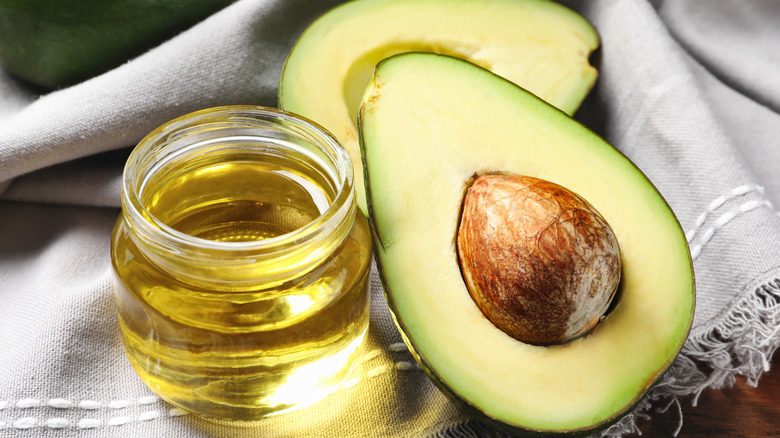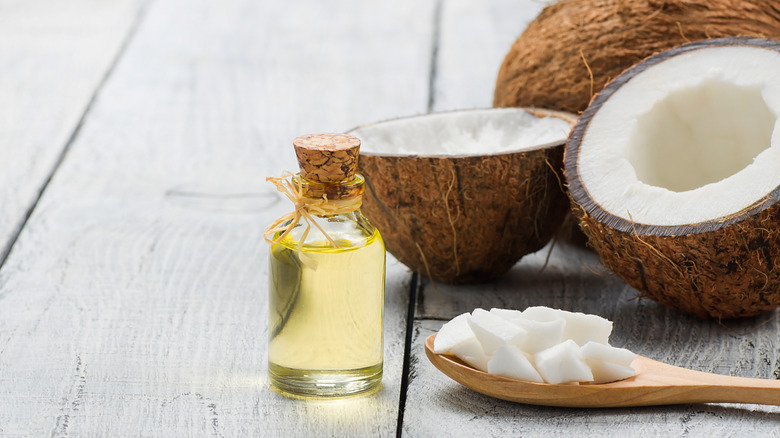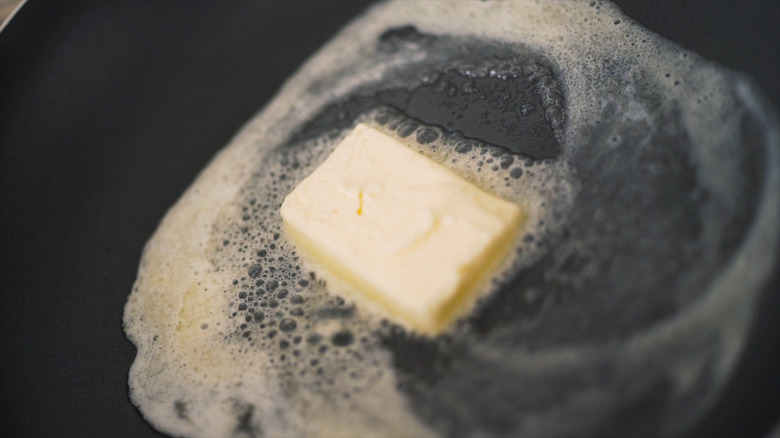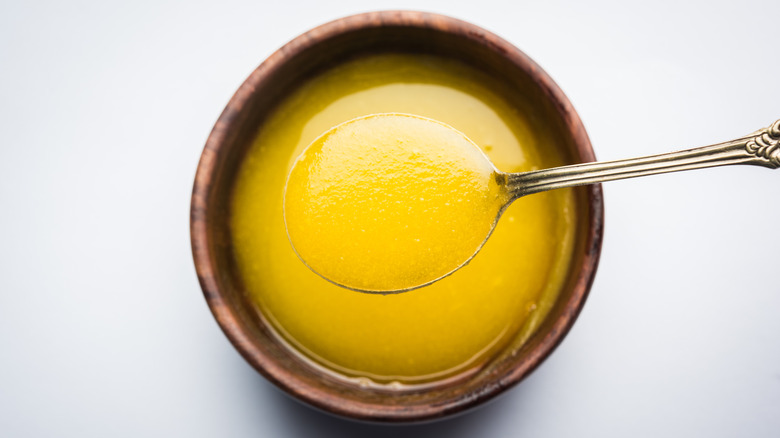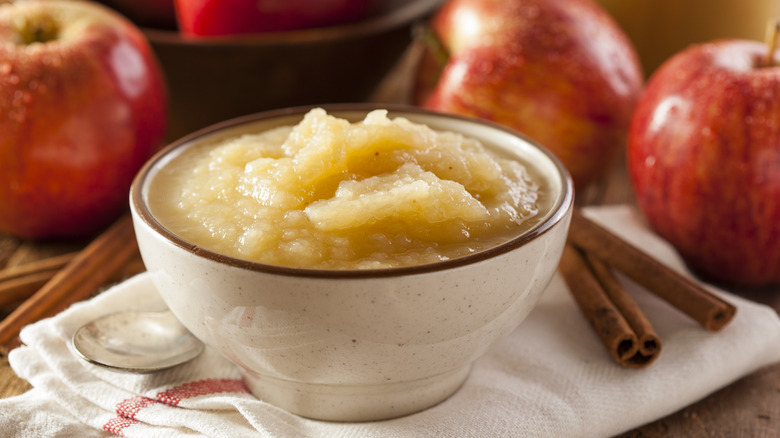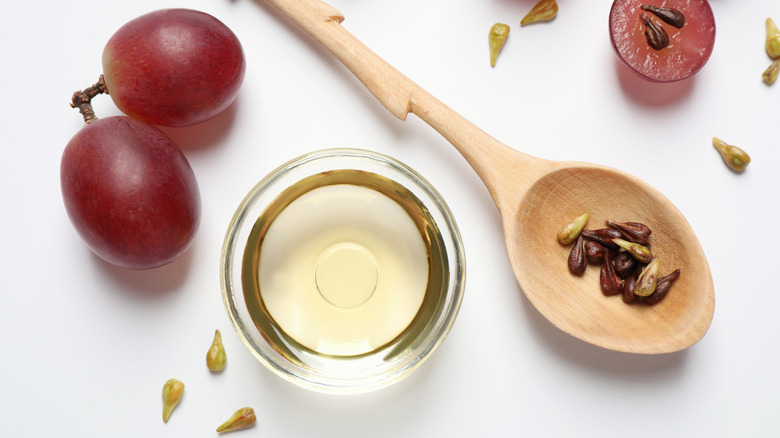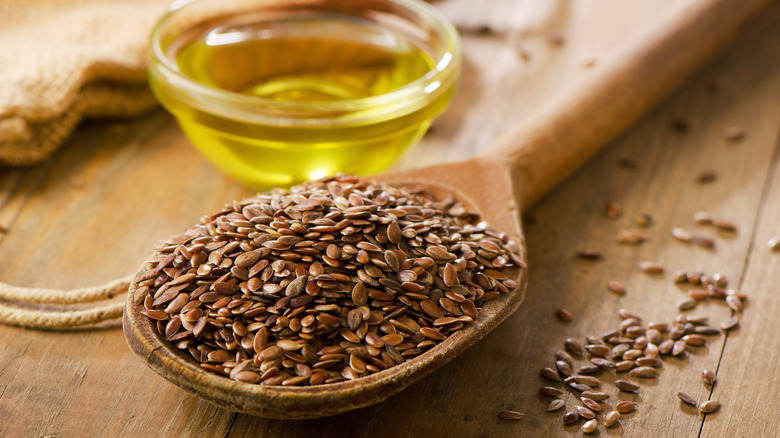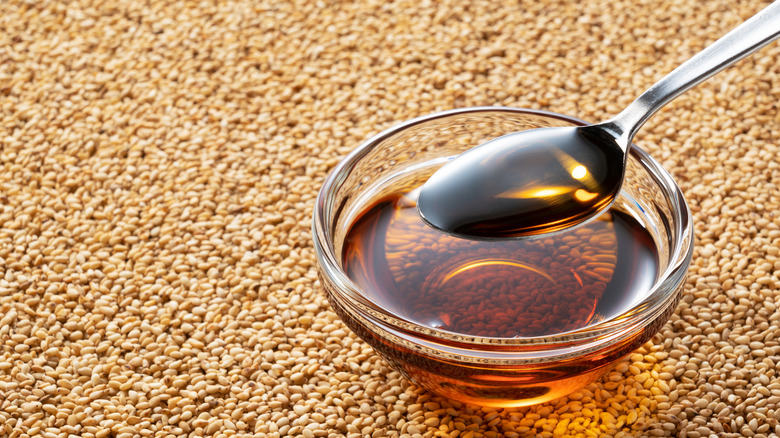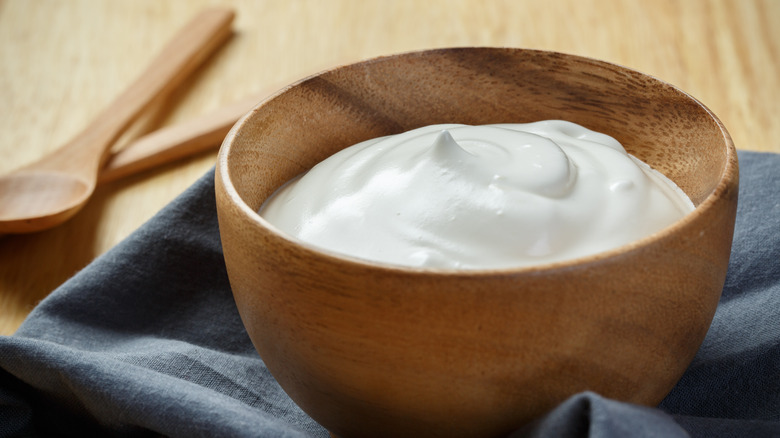10 Best Substitutes For Vegetable Oil
We may receive a commission on purchases made from links.
It's hard to imagine a situation where you'd find yourself freshly out of vegetable oil. It's a pantry essential and an item so important that even "MasterChef" places vegetable oil in its meager box of pantry staples available for contestants at all times (via Newsbreak). It may be highly unlikely that you reach for a substitute for vegetable oil just because you're out of the latter however, there are plenty of reasons why you should actively be swapping vegetable oil for other oils and non-oil-based substitutes.
While some vegetable oils do contain polyunsaturated and monounsaturated fats that are healthy, others contain trans fats that are unhealthy and inorganic ones, in particular, are highly processed with chemicals. In an interview with Time, author Lisa Howard ("The Big Book of Healthy Cooking Oils") claims that since vegetable oil is a blanket term for any type of oil that comes from a vegetable, oil manufacturers can easily substitute one vegetable for another and pass it off as vegetable oil.
While its nutritional value may have you looking for alternatives to vegetable oil, there are certain things to keep in mind when choosing a substitute. Vegetable oil is a neutral oil, meaning that it has no particular flavor or odor of its own (via A Couple Cooks). Vegetable oil can be extracted from nuts, seeds, fruits, and grains and has a high smoke point which makes it suitable for high heat cooking. For this reason, Healthline suggests that it's important to choose a substitute for vegetable oil based on what you're using it for.
1. Olive oil
Olive oil is probably the handiest vegetable oil substitute, albeit a more expensive one. Olive oil is extracted from the fruits of olive trees. It contains monounsaturated fats that have numerous health benefits that may include decreasing inflammation and reducing the risk of heart disease. In fact, Healthline says that olive oil is one of the healthiest oils that you can find on a supermarket shelf.
Olive oil has a lower smoke point than vegetable oil — at 325 to 375 degrees, per MasterClass. So, it isn't ideal for high heat cooking like frying. Unlike the flavorless vegetable oil, olive oil has a strong flavor and shouldn't be used in baking. On the flip side, its strong flavor makes olive oil an excellent substitute for vegetable oil in sautéing, salad dressings, and marinades.
For best results, you should use a 1:1 ratio to substitute vegetable oil with olive oil in your recipe.
2. Avocado oil
Another healthy cooking oil that you can use instead of vegetable oil is avocado oil. Avocado oil is extracted from the pulp of avocados and contains a high amount of oleic acid which is a type of monounsaturated fat (via Farmer's Almanac).
Avocado oil has a high smoke point which is even higher than that of vegetable oil (via Pure Wow). So you can go ahead and use avocado oil for deep frying and all high heat cooking. This oil also has a rich and creamy mouthfeel and a buttery flavor. That means it can add an extra oomph to salad dressings.
You can use equal amounts of avocado oil to substitute vegetable oil in your recipe.
3. Coconut oil
Coconut oil is made from the white flesh inside a coconut, also known as coconut meat. Apart from its lovely tropical aroma, coconut oil does have certain health benefits that may make it a great substitute for vegetable oil. Coconut oil contains lauric acid, which is a type of saturated fat that is linked to raising HDL or good cholesterol levels in your body (via Healthline).
If you don't mind the added hit of a coconut flavor, coconut oil can be a good substitute for vegetable oil in baked goods. Coconut oil too has a high smoke point and can be used for high heat cooking. Unlike other oils, coconut oil can become solid when left at room temperature so be sure to account for a few extra minutes in your cooking time to heat the coconut oil for it to become liquid again. Be warned, though, that if you're using coconut oil with other cold ingredients that are straight out of the refrigerator, the oil may become solid again.
A 1:1 ratio works best when substituting vegetable oil with coconut oil.
4. Butter
Butter and vegetable oil are often used interchangeably, unless well, you're deep-frying let's say...chicken wings. In fact, some may say that frying garlic in butter is a gazillion times better than frying it in vegetable oil. Maybe it's the nutty garlicky aroma or the lovely foaming that happens in the pan when frying butter that makes butter so much better.
Although butter is considered to be the cause of all things bad when it comes to food, butter actually isn't all that bad, especially when you compare it to vegetable oil. Butter contains a high amount of saturated fat as well as vitamins A, E, and K12 that have a host of benefits of their own, per Delishably. Butter can be used instead of vegetable oil in both sweet and savory recipes. It's a no-brainer alternative to vegetable oil in baking brownies, cakes, and the likes but you can also use it for stir-frying.
To substitute vegetable oil with butter, melt the butter first and then use a 1:1 ratio to replace vegetable oil with melted butter.
5. Ghee
Ghee is a type of clarified butter that is made by heating butter until the liquid and milk solids separate from the butter, leaving behind only the oil that is ghee. Ghee has been around for thousands of years and has been linked to various health benefits. According to the ancient Ayurvedic medicinal tradition, ghee has anti-inflammatory properties and can help with digestion (via Bon Appétit).
Ghee can be used for high heat cooking due to its high smoke point. Ghee has a roasted and nutty flavor which makes it a good vegetable oil substitute for baking. Try using ghee to toast spices. Doing so will not only make the spices more flavourful than vegetable oil would, but it will also boost the medicinal properties of the spices.
To substitute vegetable oil with ghee, you can use a 1:1 ratio in your recipe.
6. Applesauce
Applesauce is far from what you would think of when you think of vegetable oil substitutes and rightly so, it sounds extremely strange. However, applesauce is actually a very good substitute for vegetable oil in baking, and baking alone.
Creamy applesauce will add lots of moisture to bakes and will make them soft and fluffy (via Pure Wow). Mashed and puréed fruits like applesauce also add fewer calories to bakes than vegetable oil does. However, there are a few things to be careful of when using applesauce instead of vegetable oil in baking recipes. Applesauce is naturally quite sweet and so, you should reduce the amount of sugar you add on top in your recipe. A Couple Cooks also warns that while applesauce will make your bakes soft, they can become a little too soft so you might want to tweak your recipe a bit.
It's best to substitute one part vegetable oil with half parts applesauce and half parts another oil-based substitute of vegetable oil. However, you could also use a 1:1 ratio of vegetable oil to applesauce.
7. Grapeseed oil
Grapeseed oil is a by-product of making wine and is extracted from grape seeds. According to Healthline, grapeseed oil contains monounsaturated and polyunsaturated fats as well as vitamin E, which is all good stuff. However, the oil also contains a high amount of omega-6 fatty acids. While some amount of omega-6 fatty acids is fine, there is a fine line — consume too much, and the risk of inflammation and disease increases.
Nevertheless, there are many reasons why grapeseed oil makes for an excellent substitute for vegetable oil. For one, grapeseed oil is a neutral oil just like vegetable oil. This means that grapeseed oil too is flavorless and odorless. So, you can use grapeseed oil in any recipe where you don't want the oil to have an added flavor of its own (think herb-infused oil recipes). Grapeseed oil also has a high smoke point so you can use it to grill, fry, and broil. You could also use grapeseed oil to deep fry food instead of vegetable oil, however, grapeseed oil can be expensive so it may be better to leave deep frying to another vegetable oil substitute.
To substitute vegetable oil with grapeseed oil, use a 1:1 ratio in your recipe.
8. Flaxseed oil
Flaxseed oil, also known as linseed oil, is extracted from the ripened seeds of the flax plant — flaxseeds. Considering the many health benefits associated with flaxseeds, it's obvious that flaxseed oil, too, is a pretty healthy oil. Flaxseed oil is a great source of fiber and may help lower cholesterol as well as reduce the risk of heart disease (via Healthline).
Flaxseed oil is not suitable for heating and should therefore not be used as a substitute for vegetable oil in any recipe that requires the oil to be cooked or baked. It is, however, a great vegetable oil replacement for making salad dressings and marinades as well as to be used as a drizzling oil over already cooked food.
For best results, use a 1:1 ratio to substitute vegetable oil with flaxseed oil.
9. Sesame oil
Sesame oil has long been considered a go-to oil for stir-frying and drizzling in Asian and Middle Eastern cooking. Sesame oil is extracted from raw sesame seeds and is packed with so much nutrition that it is often considered to be the "Queen of Oilseeds" (via Healthline). Sesame oil is rich in antioxidants, may help reduce inflammation, improve heart health, regulate blood sugar, and may help with arthritis.
Unrefined sesame oil has a nutty flavor and is best used for low to medium heat cooking like sautéing and stir-frying. Refined sesame oil undergoes more processing and so, it is a neutral oil that can be used for frying. Deep brown colored toasted sesame oil is most suitable for salad dressings and marinades. Due to its strong flavor, it's best not to use sesame oil in baking. You should also use sesame oil sparingly in dishes as it can easily overpower other flavors.
You can use a 1:1 ratio to substitute vegetable oil with sesame oil.
10. Yogurt
A good substitute to use for vegetable oil in baking is yogurt. Carol Aguirre, registered dietician with Nutrition Connections, said to Livestrong that using yogurt in place of vegetable oil will not only reduce the amount of fat in baked goods but will also add calcium, protein, and vitamin B to the treats. Due to its high protein content, yogurt will also turn your bakes into more filling snacks.
You can use most unflavored kinds of yogurt including Greek, fat-free, or low-fat yogurt in place of vegetable oil. When using plain yogurt, don't be surprised if the end result turns out to be a bit tangy, similar to the tang of buttermilk (Greek yogurt is even tangier). You could also use vanilla yogurt for extra flavor. When using yogurt instead of vegetable oil, Aguirre warns that the amount of moisture in your bakes will increase. Make sure to cut down on other liquid ingredients in your recipe.
For best results, use three-quarters of a cup of yogurt for every cup of vegetable oil in your recipe.
